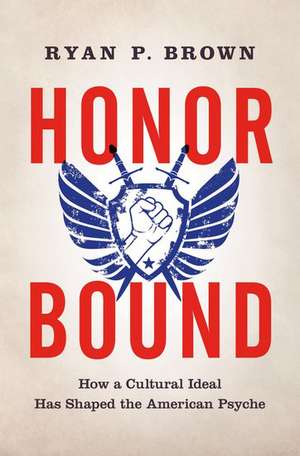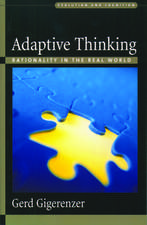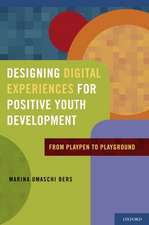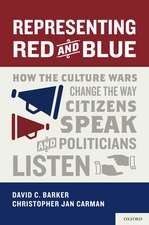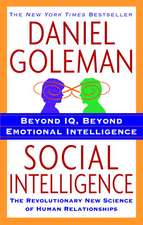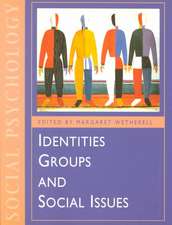Honor Bound: How a Cultural Ideal Has Shaped the American Psyche
Autor Ryan P. Brownen Limba Engleză Paperback – 22 mar 2018
| Toate formatele și edițiile | Preț | Express |
|---|---|---|
| Paperback (1) | 158.20 lei 10-16 zile | |
| Oxford University Press – 22 mar 2018 | 158.20 lei 10-16 zile | |
| Hardback (1) | 219.28 lei 6-8 săpt. | |
| Oxford University Press – 30 iun 2016 | 219.28 lei 6-8 săpt. |
Preț: 158.20 lei
Preț vechi: 172.34 lei
-8% Nou
Puncte Express: 237
Preț estimativ în valută:
30.28€ • 32.87$ • 25.43£
30.28€ • 32.87$ • 25.43£
Carte disponibilă
Livrare economică 22-28 martie
Preluare comenzi: 021 569.72.76
Specificații
ISBN-13: 9780190693800
ISBN-10: 0190693800
Pagini: 232
Dimensiuni: 155 x 231 x 15 mm
Greutate: 0.27 kg
Editura: Oxford University Press
Colecția OUP USA
Locul publicării:New York, United States
ISBN-10: 0190693800
Pagini: 232
Dimensiuni: 155 x 231 x 15 mm
Greutate: 0.27 kg
Editura: Oxford University Press
Colecția OUP USA
Locul publicării:New York, United States
Recenzii
Deep, wise, meticulously researched and beautifully written, Honor Bound shows how one strange and powerful concern has shaped the American mind.
Honor Bound gives lie to the notion that Big Box stores, the Internet, and the other homogenizing influences of the modern world have turned America into a bland monoculture. Far from it, here Ryan Brown shows that the people of the United States continue to vary dramatically in their fundamental orientations to the concept of honor, which influences virtually everything we do with each other, for each other, and to each other. Thorough, imaginative, and winsomely written.
Around the world, honor is one of the great motivating forces behind human behavior. Here in the U.S., it plays an important, though often unacknowledged role. In Honor Bound, Ryan Brown offers a panoramic tour of honor's influence on many areas of American life, including homicides, naming practices, football, foreign policy, and mental health to name a few. Brown is one of the top psychologists studying honor, and his book offers an excellent and highly accessible introduction to this powerful cultural ideal.
One of the best things about this book is the far-ranging implications of the culture of honor that Brown and others have investigated. Their work spans individual consequences of the honor ideal (mental health, suicide rates, risk-taking) and social consequences (e.g., state spending on mental health, rates of bomb scares in schools, stand your ground laws, and domestic violence rates). It presents a convincing case that the honor ideal is pervasive and central to the psyche of American Southerners and Westerners. The fact that it is written by a Southerner who has experience in different parts of the South and Southwest is also a plus. Count me a fan. This book will have an important place on my shelf and in my classes.
In most regional cultures, including those in the U.S., people work hard to earn honor-by protecting community values, for example, or defending a family member's reputation. Superficially, this is a good thing; it encourages people to behave appropriately. But there is a downside, argues social psychologist Ryan P. Brown in his new book, Honor Bound: How a Cultural Ideal Has Shaped the American Psyche. Research suggests that if a society is overly concerned with honor, its members can become hypersensitive to insults. Consider the question 'What did you just call me?' writes Brown, which is often a 'prelude to potential violence.' Or the statistics, he adds, that show a correlation between certain honor obsessed areas of the South and higher rates of domestic violence and school shootings. Ironically, Brown concludes, putting a premium on honor is "the primary force that makes honor cultures so often not honorable.'
Honor Bound, a new book by social psychologist Ryan Brown, lists US states by how concerned residents are about their reputation and their desire to retaliate against perceived slights. The top 10 are South Carolina, North Carolina, Alabama, Georgia, Arkansas, Mississippi, West Virginia, Virginia, Tennessee and Texas. Trump was victorious in all of these except for Virginia." -Chris Simms, NEW SCIENTIST
We've heard a lot about honor, bravery, and trust during the 2016 election. Though these words often conjure up images of power and chivalry, social scientists who study honor cultures in America see things differently. They say the desire to defend one's honor is more likely to have negative consequences than positive ones. Regionally, states in the southern and western parts of the United States are more likely to have cultures who exhibit 'honor syndrome,' and the strain to live up to reputation leads to higher incidents of violence, risk taking, and suicide. Here to explain is Ryan Brown, is professor of social psychology at the University of Oklahoma and is author of Honor Bound: How a Cultural Ideal Has Shaped the American Psyche." -WNYC Public Radio
Most social scientists would say majority of societies in history have been 'honor cultures' or cultures that put effort into making sure their community and family reputations are defended and maintained. Our guest tells us how American society has deep roots in honor culture and how that impacts everything from public policy to whether or not to put elderly relatives in nursing homes." -Wisconsin Public Radio
How do ideas about personal honor and/or reputation shape our lives and relationships? How do they affect American society as a whole? And how have they helped to shape our history as a nation? On this edition of our show, we speak with Ryan P. Brown, a professor of social psychology at The University of Oklahoma. Brown has been conducting research on how people think, feel, and behave for over 20 years, and he speaks with us about his new book, just out from Oxford University Press, which is called Honor Bound: How a Cultural Ideal Has Shaped the American Psyche. As is noted of this book at the OUP website: 'While most human societies throughout history can be described as 'honor cultures,' the United States is particularly well-known for having a deeply rooted culture of honor, especially in the American South and West." -Public Radio Tulsa
Honor Bound gives lie to the notion that Big Box stores, the Internet, and the other homogenizing influences of the modern world have turned America into a bland monoculture. Far from it, here Ryan Brown shows that the people of the United States continue to vary dramatically in their fundamental orientations to the concept of honor, which influences virtually everything we do with each other, for each other, and to each other. Thorough, imaginative, and winsomely written.
Around the world, honor is one of the great motivating forces behind human behavior. Here in the U.S., it plays an important, though often unacknowledged role. In Honor Bound, Ryan Brown offers a panoramic tour of honor's influence on many areas of American life, including homicides, naming practices, football, foreign policy, and mental health to name a few. Brown is one of the top psychologists studying honor, and his book offers an excellent and highly accessible introduction to this powerful cultural ideal.
One of the best things about this book is the far-ranging implications of the culture of honor that Brown and others have investigated. Their work spans individual consequences of the honor ideal (mental health, suicide rates, risk-taking) and social consequences (e.g., state spending on mental health, rates of bomb scares in schools, stand your ground laws, and domestic violence rates). It presents a convincing case that the honor ideal is pervasive and central to the psyche of American Southerners and Westerners. The fact that it is written by a Southerner who has experience in different parts of the South and Southwest is also a plus. Count me a fan. This book will have an important place on my shelf and in my classes.
In most regional cultures, including those in the U.S., people work hard to earn honor-by protecting community values, for example, or defending a family member's reputation. Superficially, this is a good thing; it encourages people to behave appropriately. But there is a downside, argues social psychologist Ryan P. Brown in his new book, Honor Bound: How a Cultural Ideal Has Shaped the American Psyche. Research suggests that if a society is overly concerned with honor, its members can become hypersensitive to insults. Consider the question 'What did you just call me?' writes Brown, which is often a 'prelude to potential violence.' Or the statistics, he adds, that show a correlation between certain honor obsessed areas of the South and higher rates of domestic violence and school shootings. Ironically, Brown concludes, putting a premium on honor is "the primary force that makes honor cultures so often not honorable.'
Honor Bound, a new book by social psychologist Ryan Brown, lists US states by how concerned residents are about their reputation and their desire to retaliate against perceived slights. The top 10 are South Carolina, North Carolina, Alabama, Georgia, Arkansas, Mississippi, West Virginia, Virginia, Tennessee and Texas. Trump was victorious in all of these except for Virginia." -Chris Simms, NEW SCIENTIST
We've heard a lot about honor, bravery, and trust during the 2016 election. Though these words often conjure up images of power and chivalry, social scientists who study honor cultures in America see things differently. They say the desire to defend one's honor is more likely to have negative consequences than positive ones. Regionally, states in the southern and western parts of the United States are more likely to have cultures who exhibit 'honor syndrome,' and the strain to live up to reputation leads to higher incidents of violence, risk taking, and suicide. Here to explain is Ryan Brown, is professor of social psychology at the University of Oklahoma and is author of Honor Bound: How a Cultural Ideal Has Shaped the American Psyche." -WNYC Public Radio
Most social scientists would say majority of societies in history have been 'honor cultures' or cultures that put effort into making sure their community and family reputations are defended and maintained. Our guest tells us how American society has deep roots in honor culture and how that impacts everything from public policy to whether or not to put elderly relatives in nursing homes." -Wisconsin Public Radio
How do ideas about personal honor and/or reputation shape our lives and relationships? How do they affect American society as a whole? And how have they helped to shape our history as a nation? On this edition of our show, we speak with Ryan P. Brown, a professor of social psychology at The University of Oklahoma. Brown has been conducting research on how people think, feel, and behave for over 20 years, and he speaks with us about his new book, just out from Oxford University Press, which is called Honor Bound: How a Cultural Ideal Has Shaped the American Psyche. As is noted of this book at the OUP website: 'While most human societies throughout history can be described as 'honor cultures,' the United States is particularly well-known for having a deeply rooted culture of honor, especially in the American South and West." -Public Radio Tulsa
Notă biografică
Ryan P. Brown, Ph.D., is a social psychologist who has conducted research on how people think, feel, and behave for over 20 years. Before joining the Doerr Institute for New Leaders at Rice University, he was the L. J. Semrod Presidential Professor of Psychology at the University of Oklahoma. He has also taught at Amherst College and the University of Texas at Austin. A native Alabamian of Scottish ancestry, he continues to write, speak, and conduct research on the social dynamics of honor in the U.S. and around the world.
